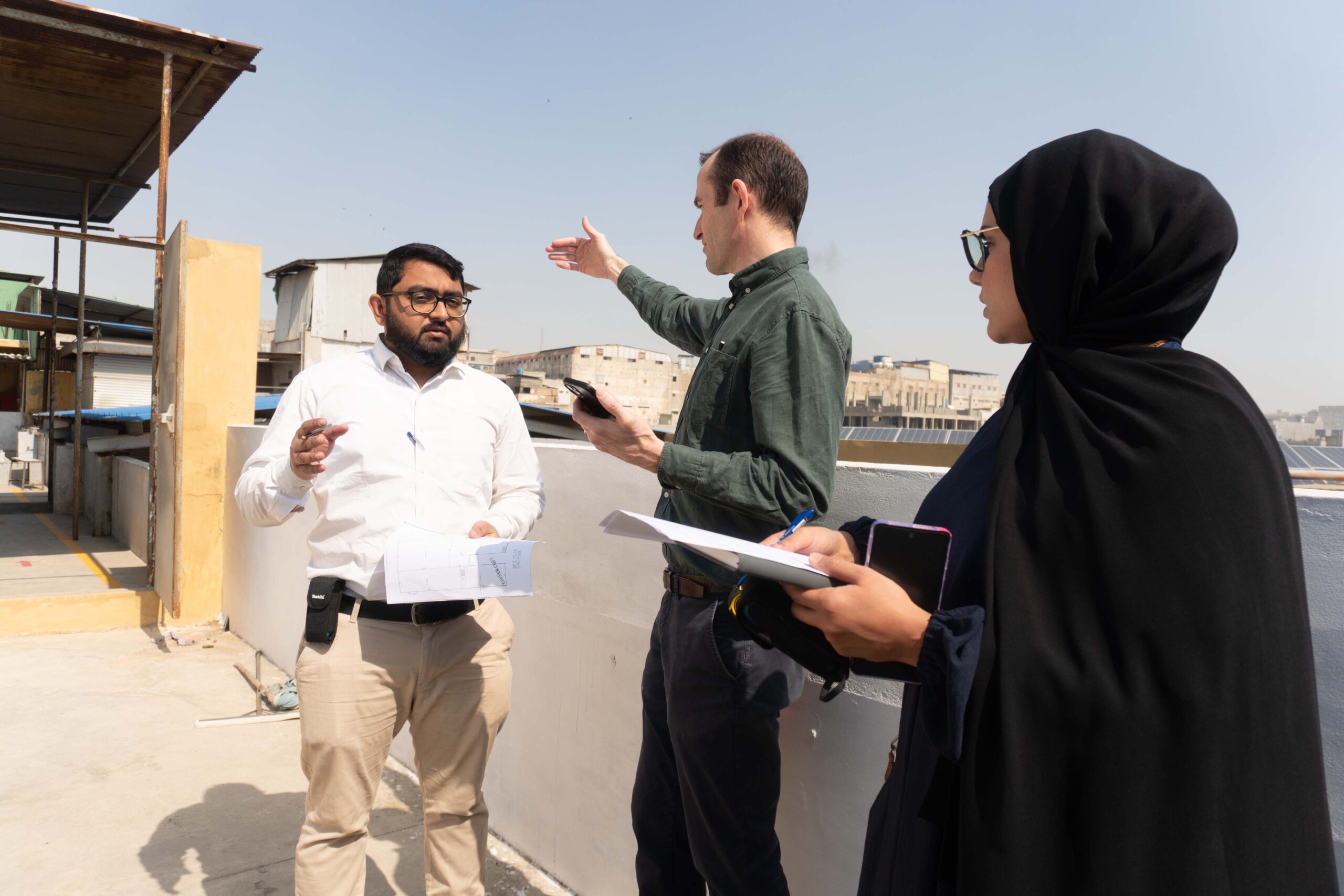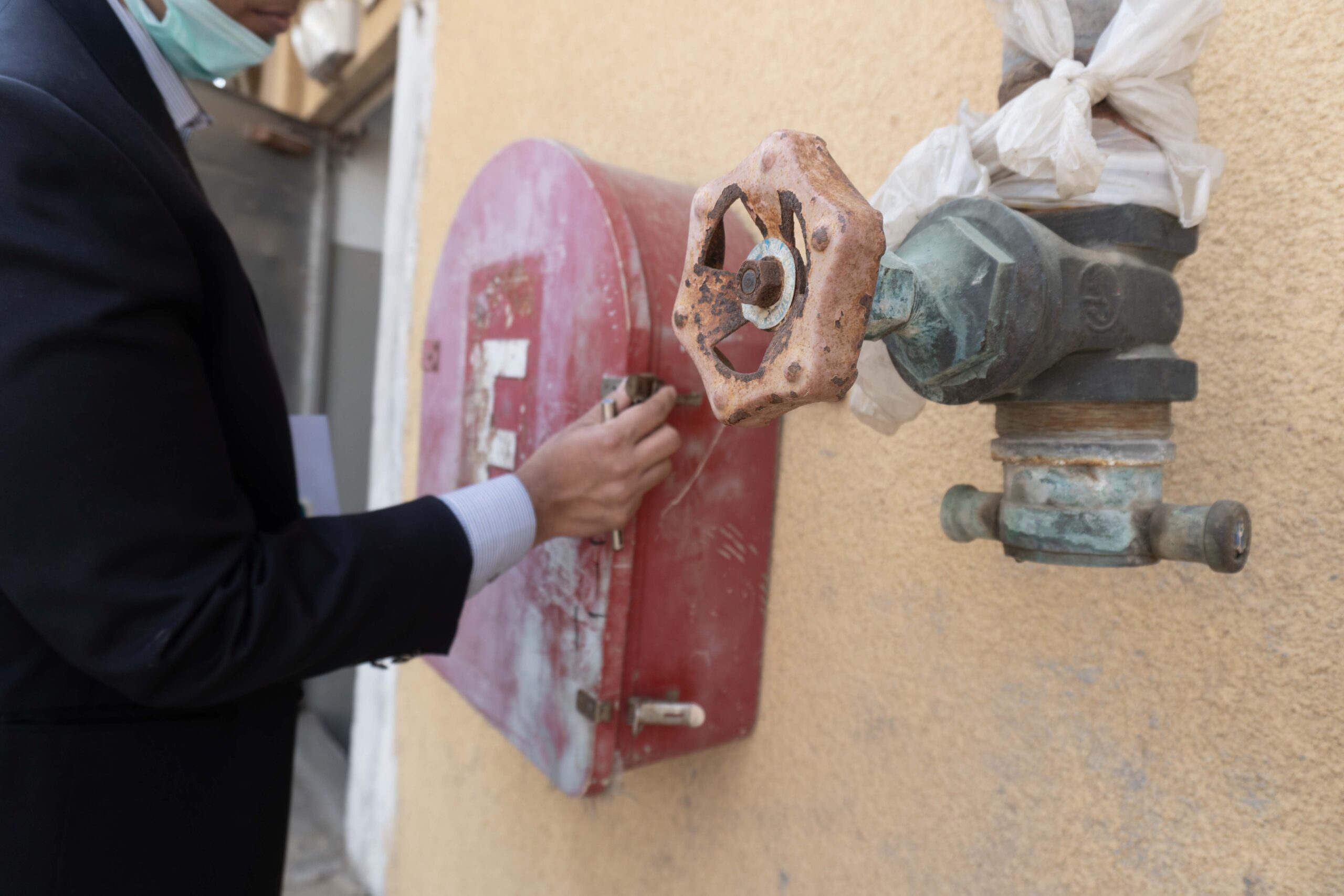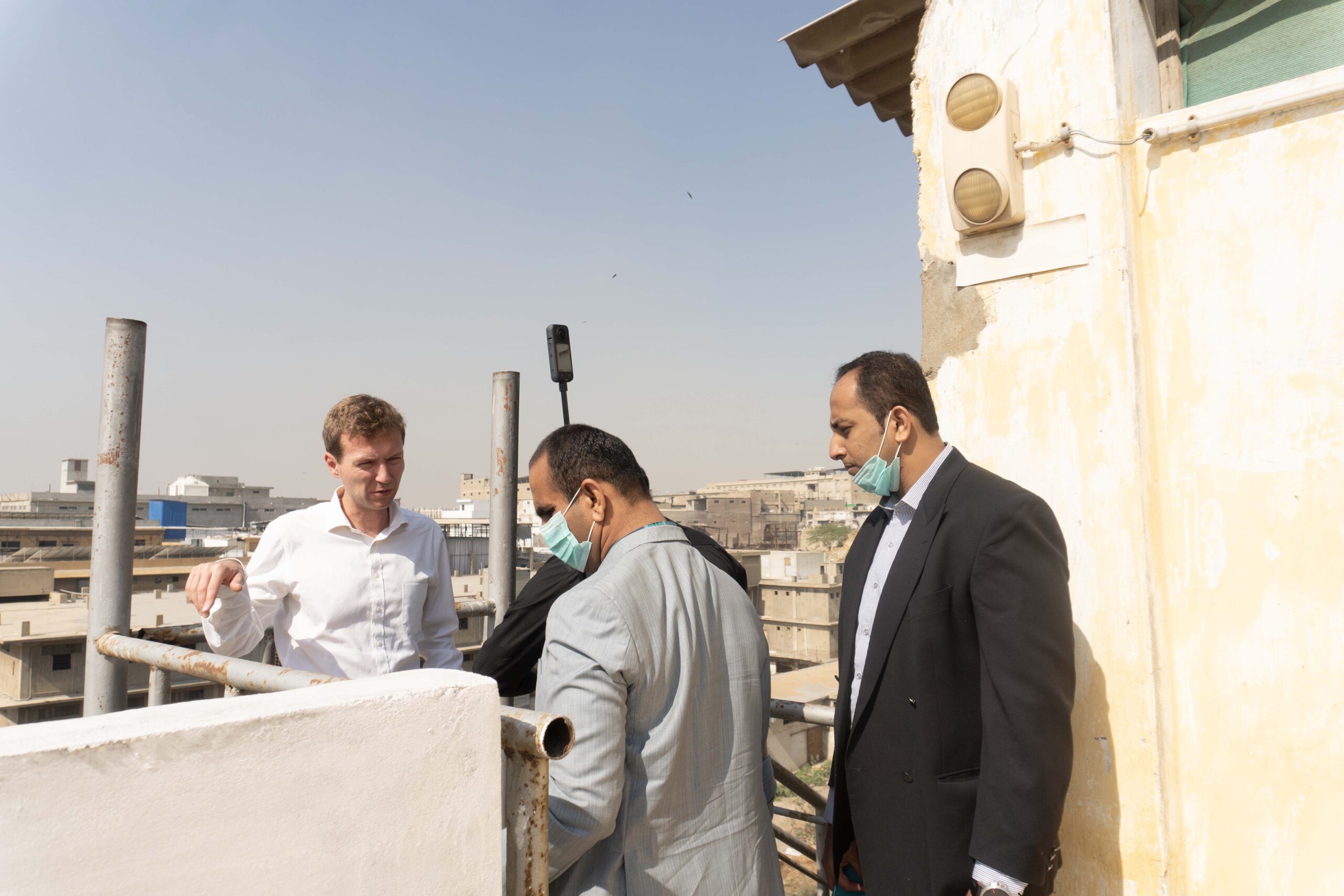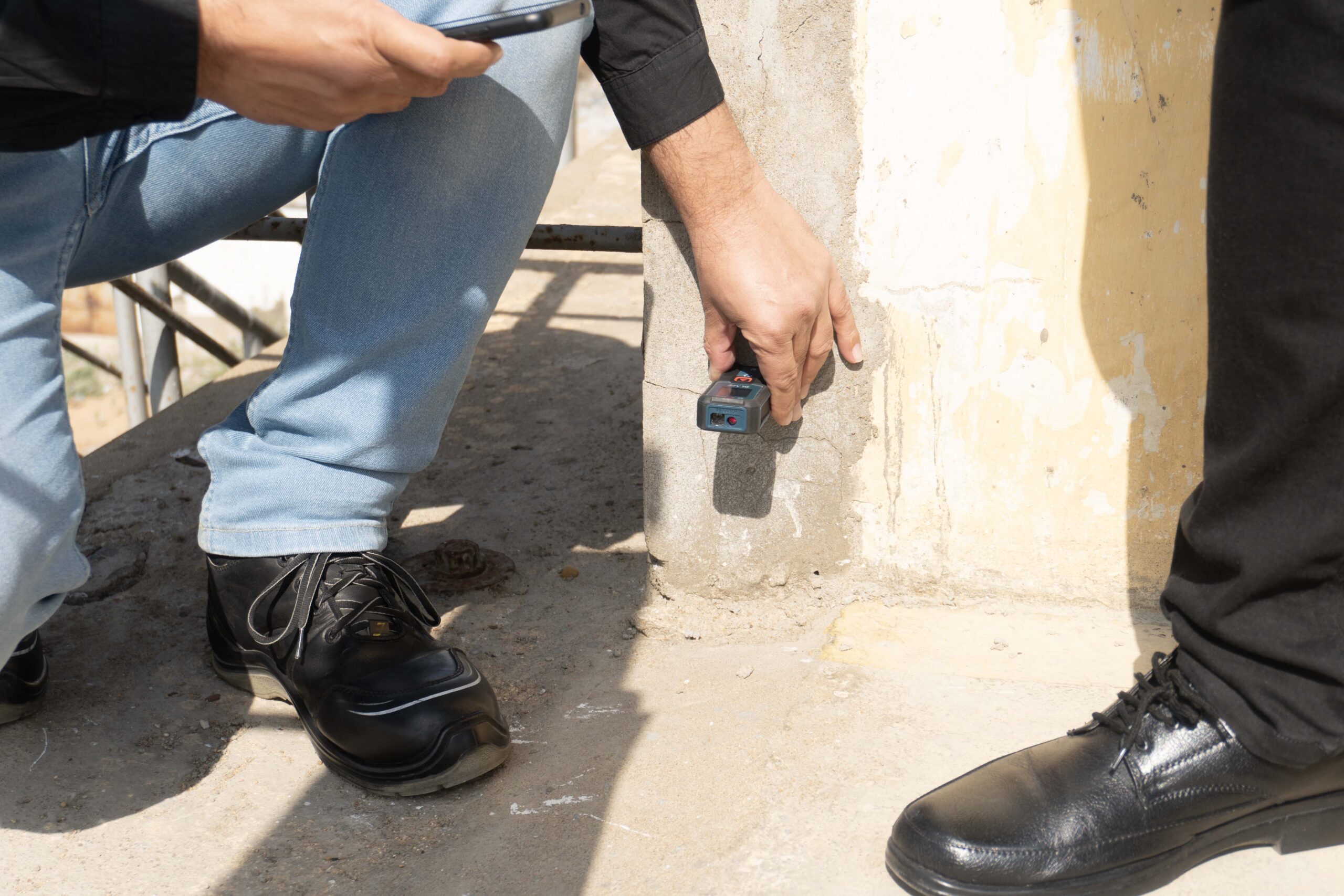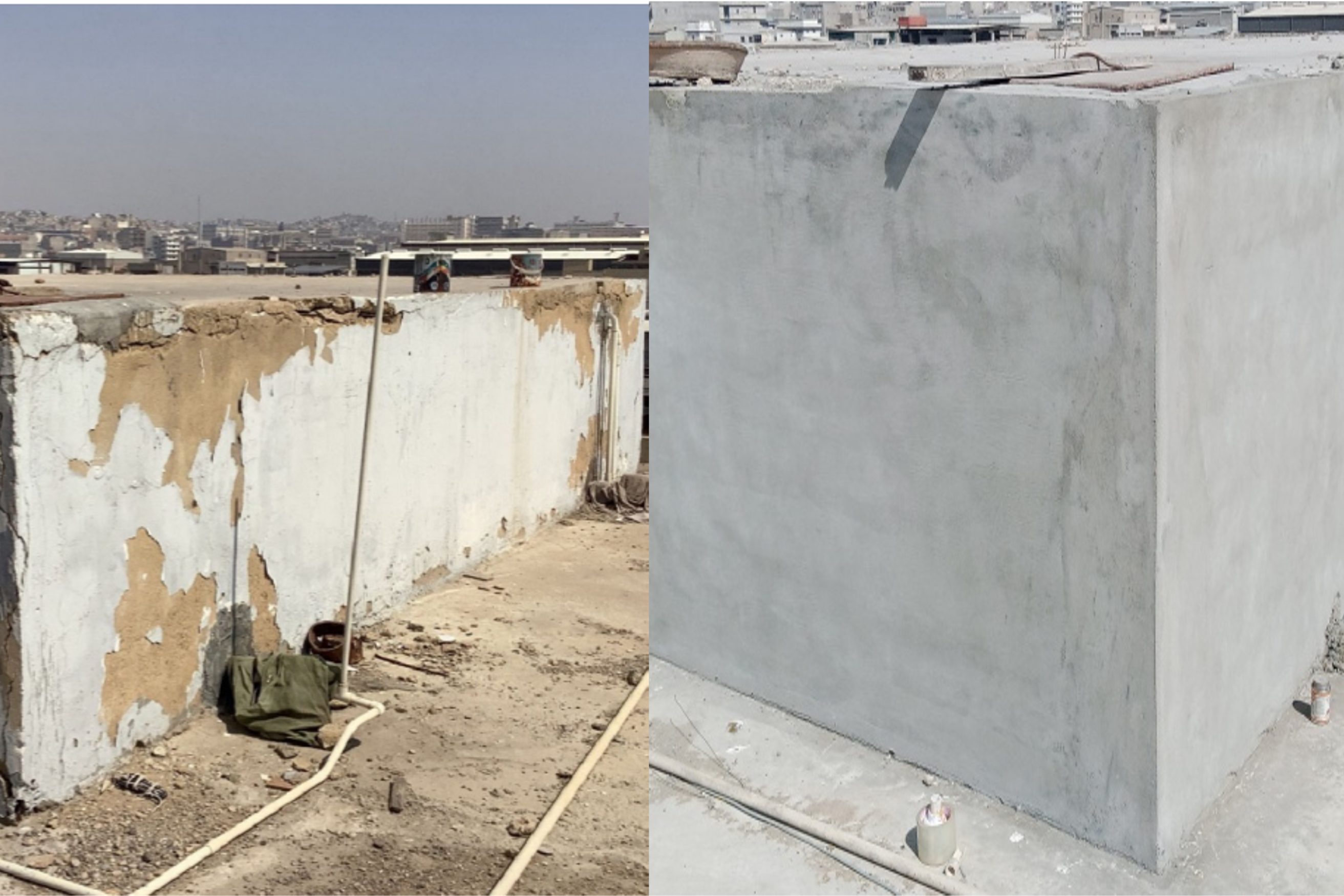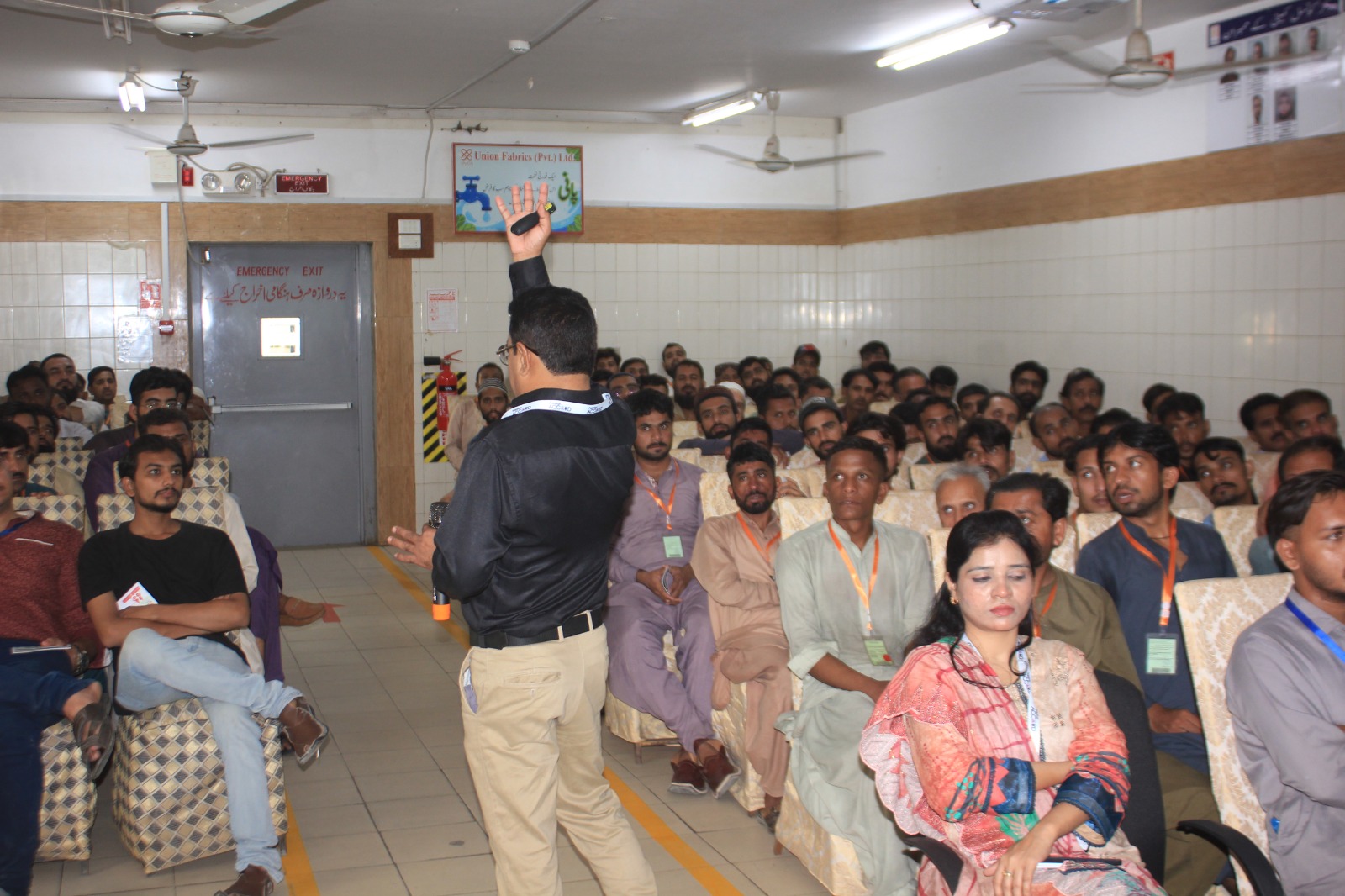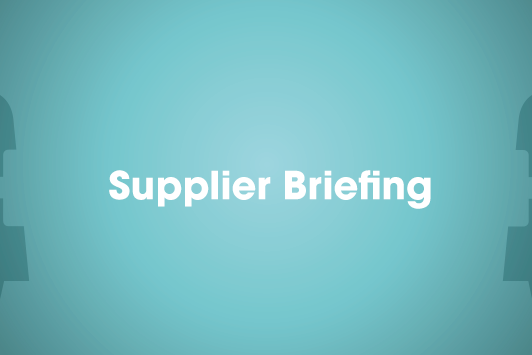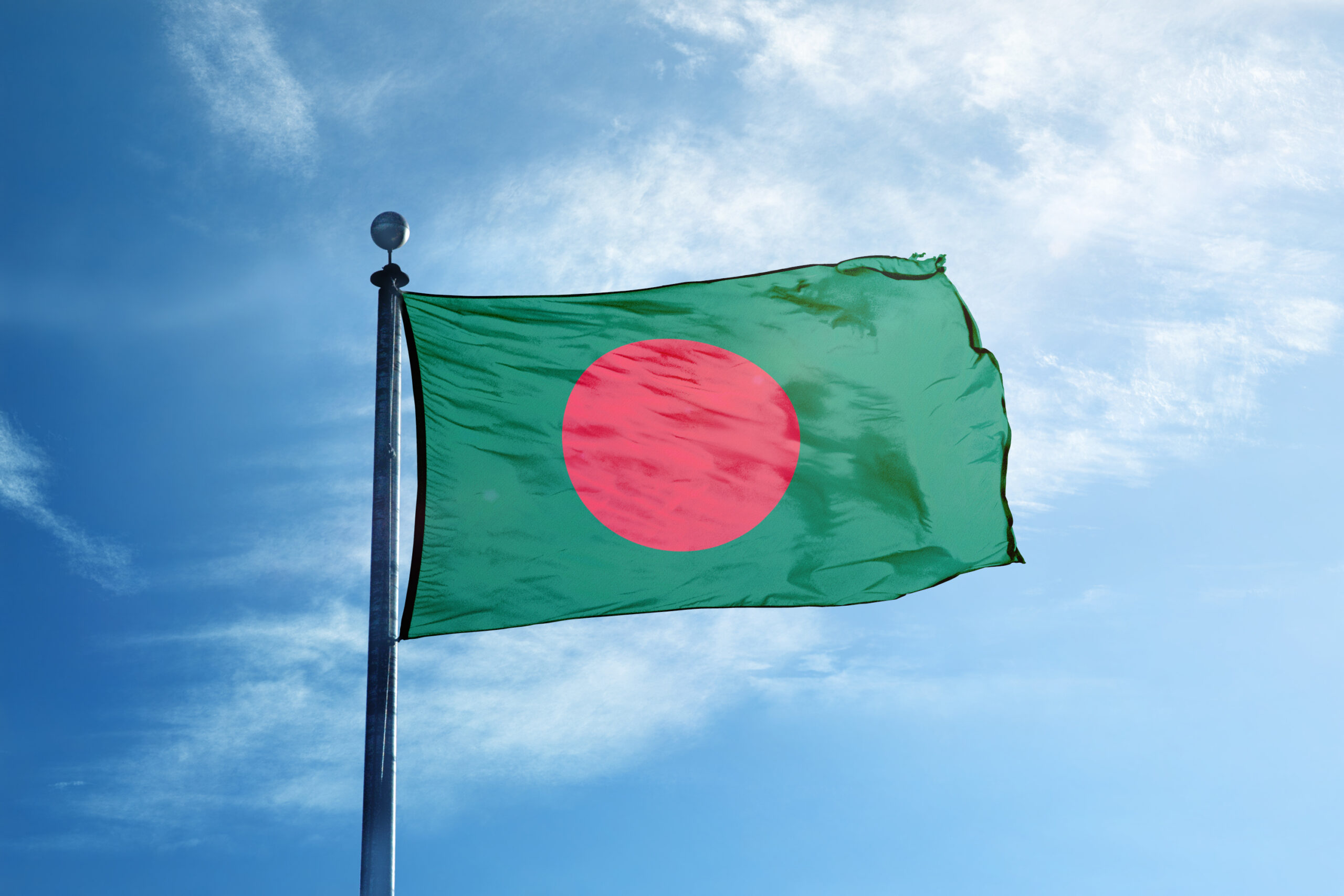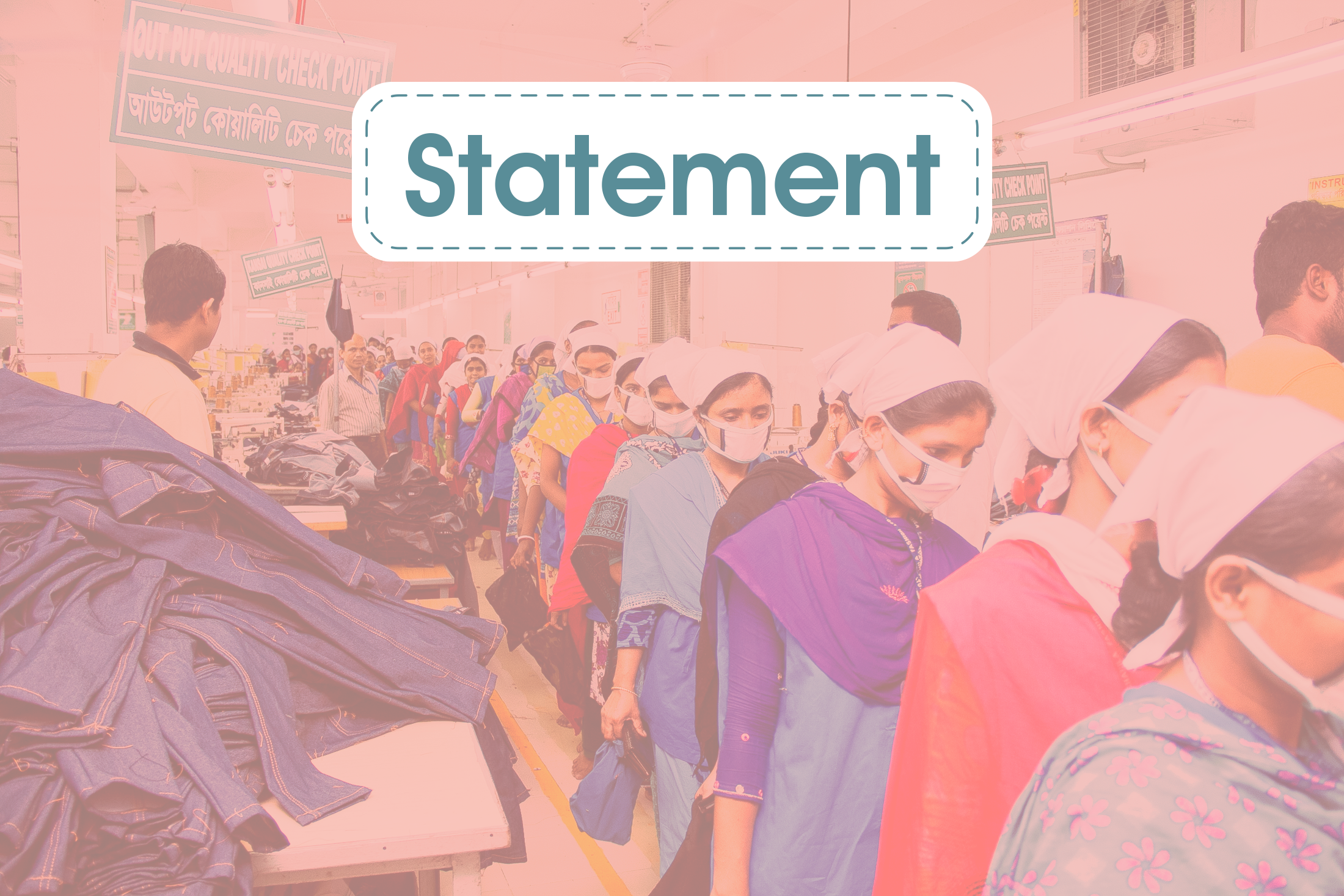Start of capacity building program for Pakistan Accord engineers
Updates on programs in Pakistan
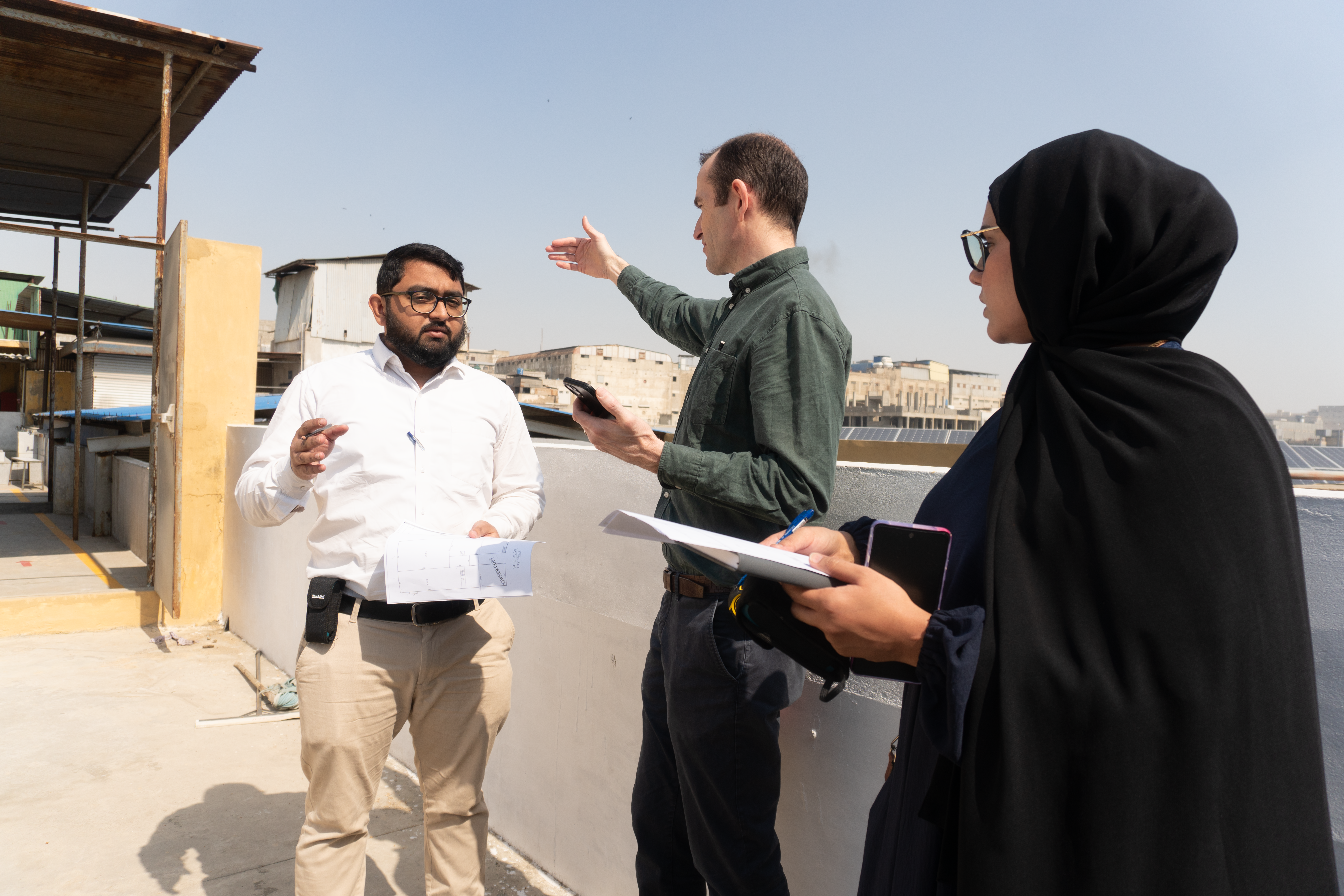
Marking a milestone in the rollout of the International Accord’s country program in Pakistan, newly hired engineers are undergoing training. The capacity-building program aims to equip engineers with the technical knowledge and practical skills necessary to effectively conduct factory inspections and produce reports that identify remediation required under the Pakistan Accord.
The program is currently underway in Karachi, Faisalabad and Lahore, Pakistan, and spans 9 weeks (with a two week break over Eid). In this inaugural batch, 14 engineers (including 5 fire engineers, 5 electrical engineers, 4 structural engineers) are undergoing training facilitated by engineering consultants, alongside George Faller (Chief Safety Officer, Pakistan Accord) and Colm Quinn (Head of Operations, International Accord).
The Capacity Building Program
The capacity building program comprises two phases focusing on classroom and on-the-job training. The initial three days emphasise introducing engineers to key Accord principles, the Pakistan Accord Building Standard, and essential key safety inspections features. Additionally, classroom sessions familiarise engineers with key safety hazards to look out for during factory assessments, and capturing this key information in reports used to develop factory Corrective Action Plans (CAPs).
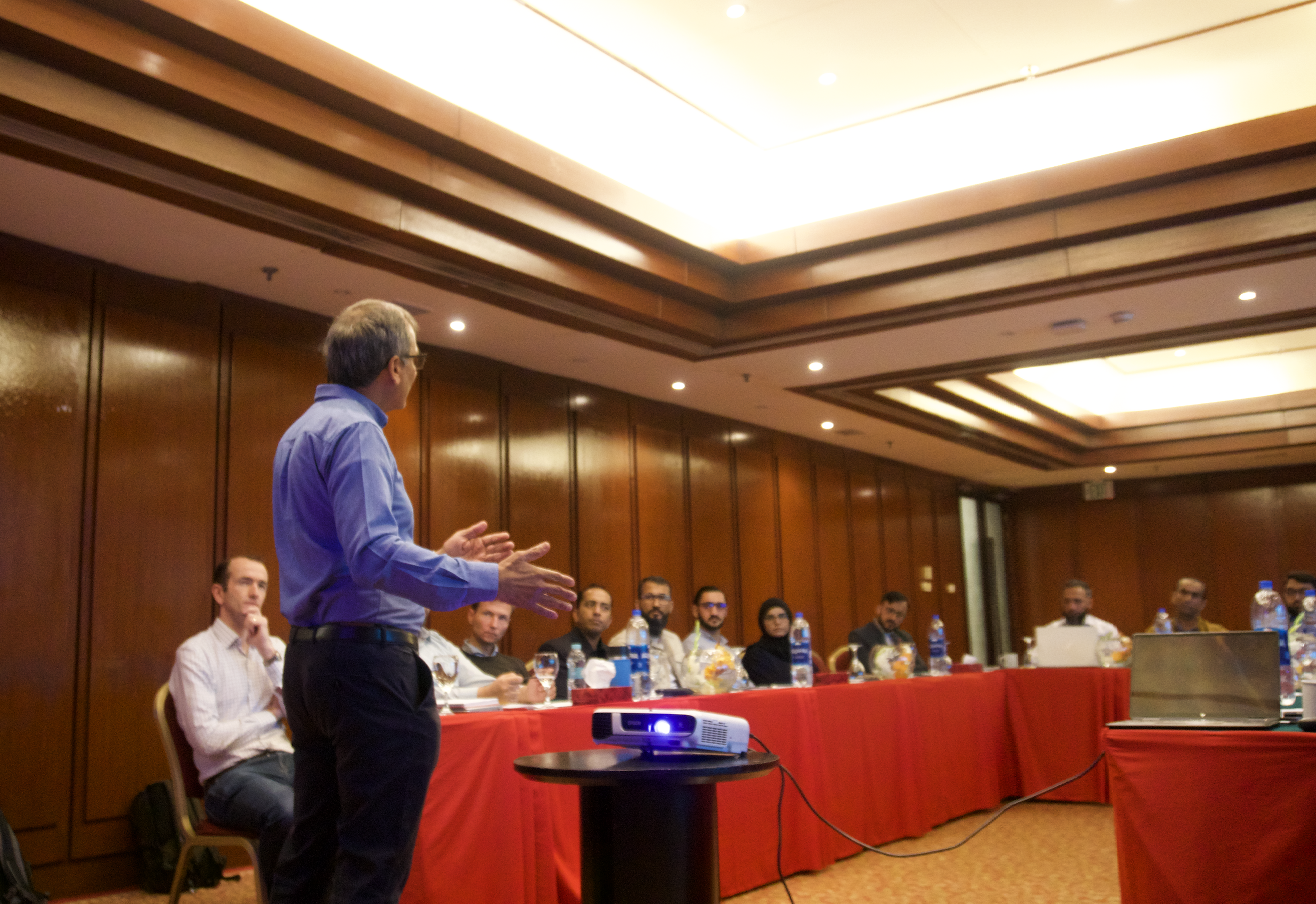
Following classroom sessions, engineers are currently undergoing a nine-week on-site building inspection and reporting training.
Factory Inspections
As part of the on-site training, trainee engineers joined the fire, electrical, and structural safety inspections at least 10 factories covered under the Pakistan Accord. Based on the complexity of the factories, these visits typically lasted one day.
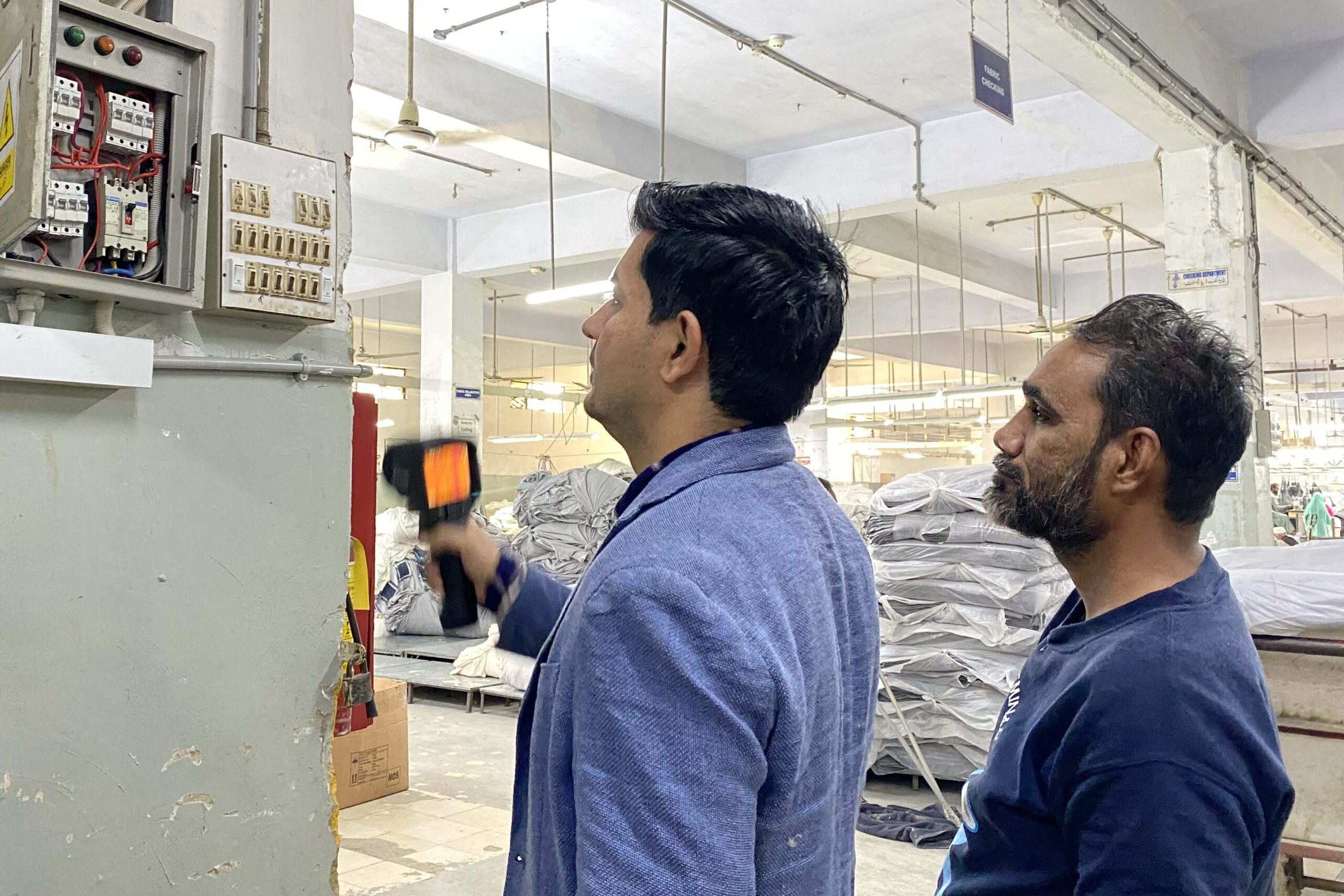
The inspection day started with an opening meeting with factory management, followed by a walk around the building exterior and through all interior rooms and spaces. The team also conducted non-destructive testing as required, for example, measuring concrete hardness and thermographic scanning to identify electrical hotspots.
These initial inspections are part of the Pakistan Accord’s inspections and remediation program that began in November 2023. This recent round of inspections brings the number of factories covered under the Pakistan Accord to receive initial inspections to over 25 factories.
Resources:
Related updates
February 18, 2025
Factories in Pakistan have begun addressing key safety findings and are implementing improvements at their facilities.
November 28, 2024
On 26 and 27 November 2024 the Pakistan Accord conducted its inaugural safety training meeting in Pakistan. The meeting was attended by all employees of the factory.
August 29, 2024
This briefing provides updates on the number of signatory brands and covered factories, the rollout of Workplace Programs, and recent events organised by the Pakistan Accord team.
August 21, 2024
The Pakistan Accord Secretariat hosted a briefing on the rollout of Workplace Programs on August 19, 2024, in Karachi.
August 8, 2024
In view of the complex political situation in Bangladesh, the International Accord makes the following statement in solidarity with the people of Bangladesh.
May 1, 2024
Day 2 of the International Accord’s All Signatory Meeting was dedicated to fostering meaningful engagement between the Pakistani industry and signatories to the Pakistan Accord.
Brand-Supplier meetings in Pakistan highlight collaboration opportunities on workplace health and safety
Updates on programs in Pakistan
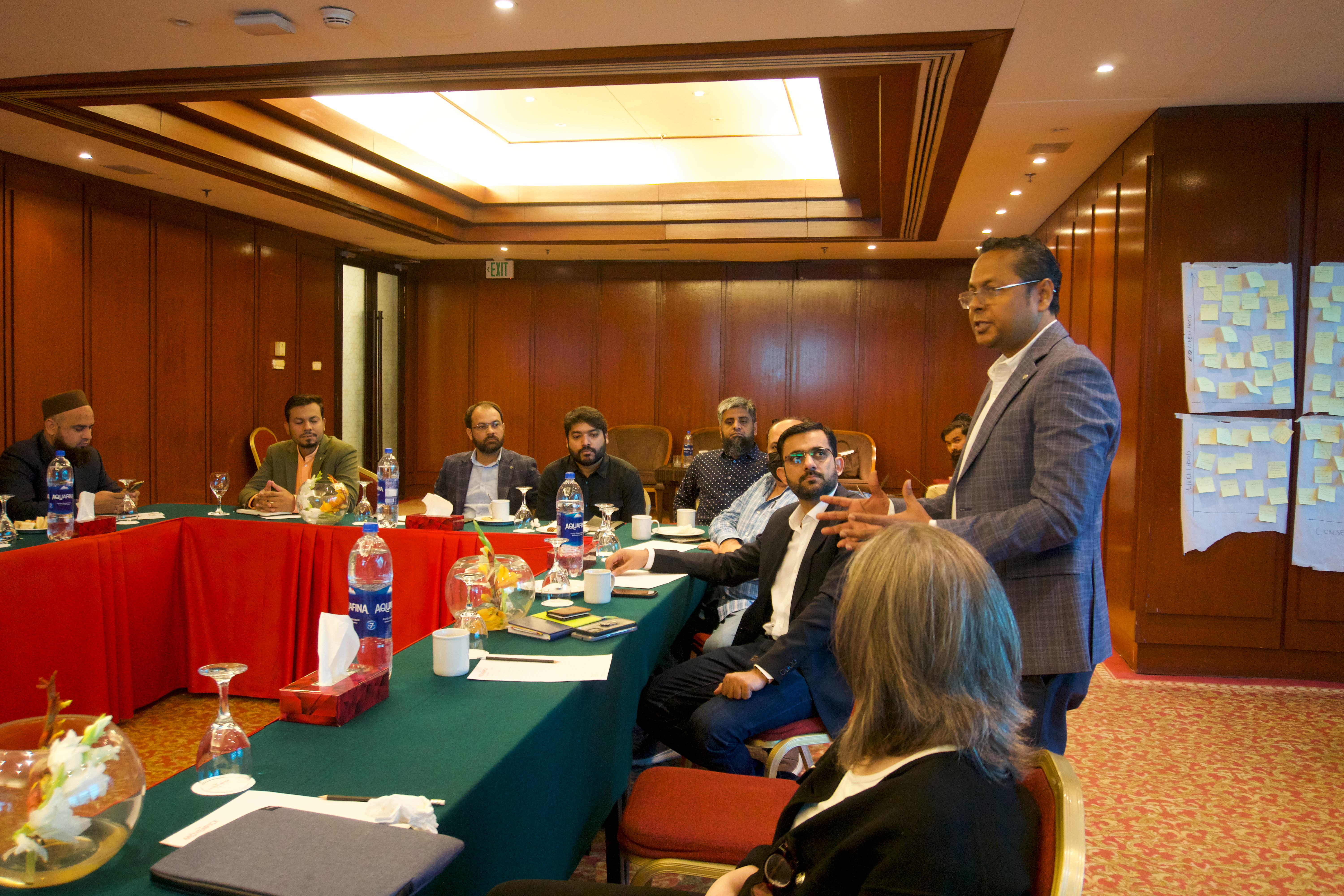
The International Accord Secretariat alongside the Pakistan Accord team organised a series of five brand-supplier meetings in Lahore and Karachi between 5 – 7 March 2024.
The purpose of these meetings was to to provide information about the Accord and its key programs for suppliers, and enhance engagement between brands that have signed the Pakistan Accord and their Pakistani suppliers. A supplier/factory becomes part of the Accord program in Pakistan once a brand sourcing from them signs the Pakistan Accord and lists it as a supplier.
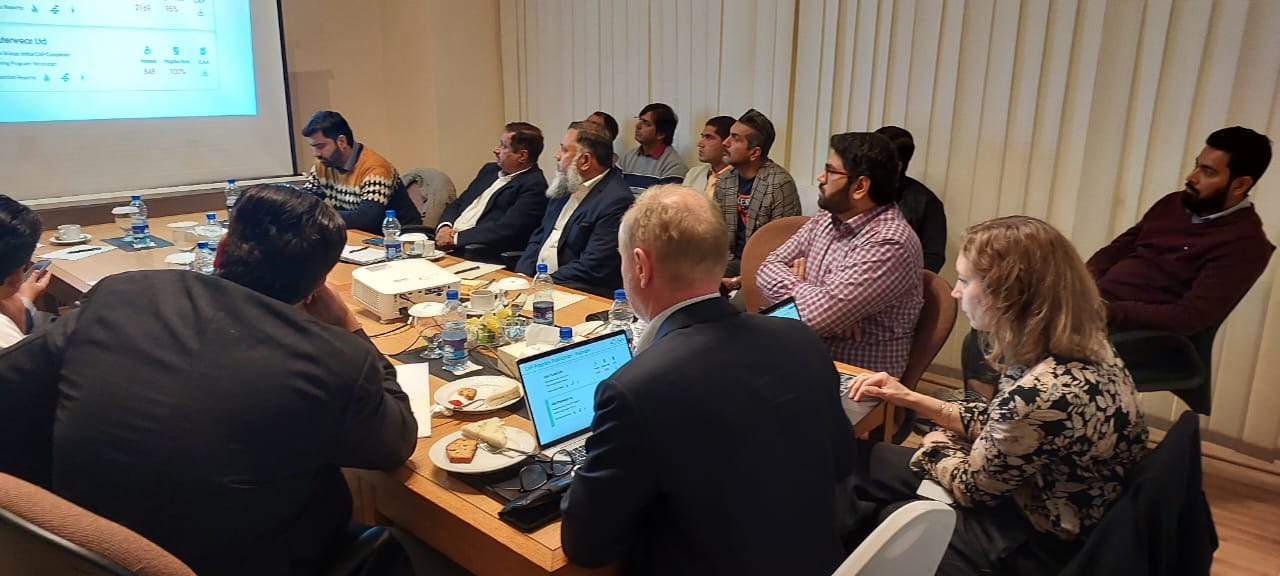
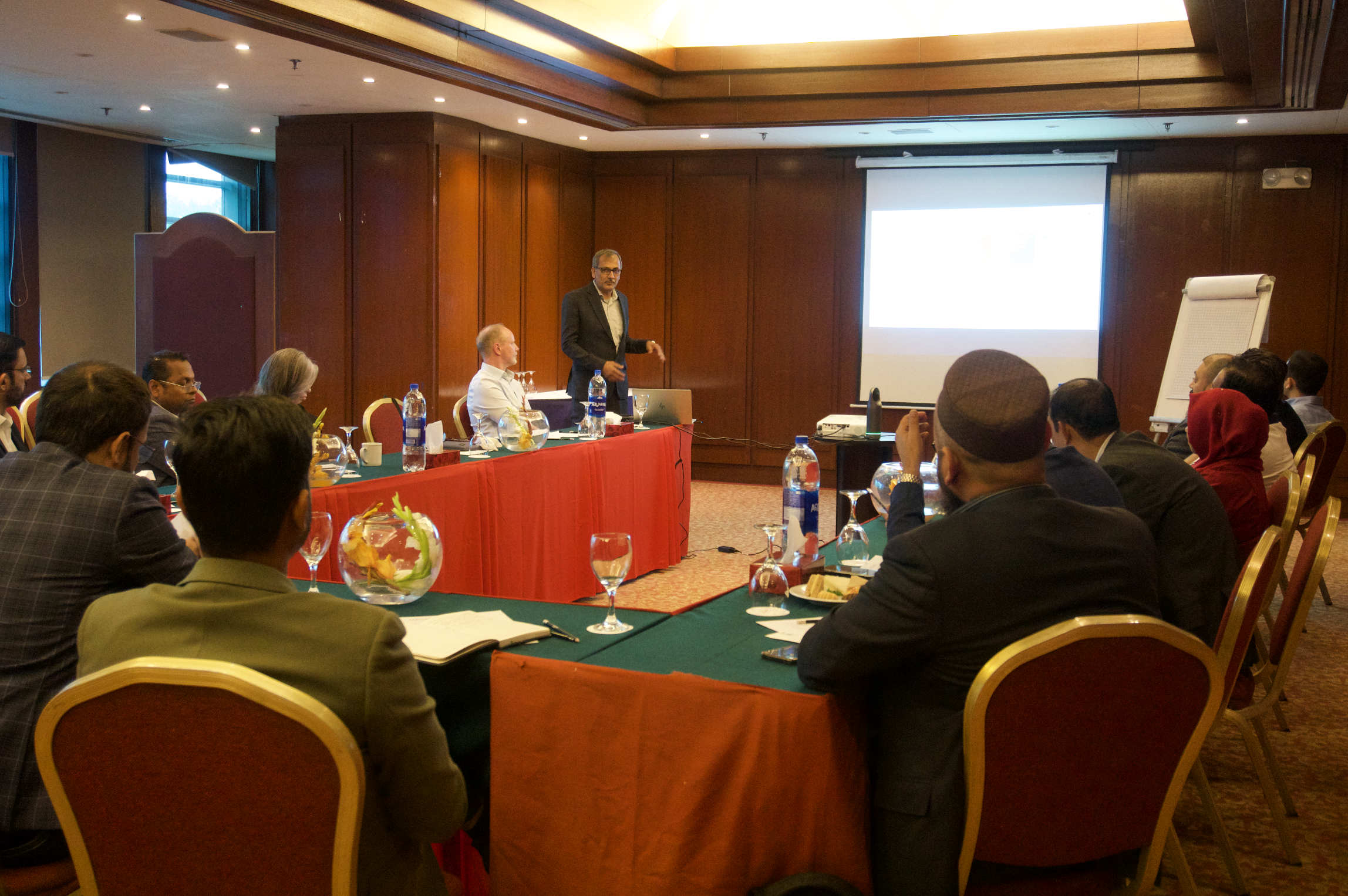
The Accord team comprising presentations by Clara Kamphorst (Stakeholder Engagement Manager), Koen Oosterom (Head of Signatory Engagement), Veronique Camerer (Deputy Director, International Accord), Kirstine Drew (Chief Complaints Officer, Pakistan Accord), and Zulfiqar Shah (Country Manager, Pakistan Accord) shared insights on:
- The health and safety topics covered under the Pakistan Accord.
- The impact of the program for suppliers and the support available for them.
- The features, programs, and reasons to participate in the Pakistan Accord.
The sessions were attended by over 100 Pakistani suppliers and Pakistan Accord signatory brands including Adidas, Primark, GAP Inc. and the Boohoo Group.
Speaking about their participation at the event, Sam Leach from the Boohoo Group said:
The Boohoo Group sees the Accord framework as a great opportunity for our factories, not only to improve their building, electrical, fire, and boiler safety standards but also to enhance worker safety standards as a whole. We have seen the great work done in Bangladesh over the last 10+ years and we look forward to continuing to collaborate with The Accord and other international retailers to improve factory standards. As a part of these collaborative efforts, the Boohoo Group and The International Accord organised two brand-supplier meetings in Pakistan for Boohoo Group suppliers and factories in Karachi and Lahore. These meetings were well received by the suppliers with follow-up expressions of gratitude. We are encouraged to see that all our suppliers recognise the importance of the Pakistan Accord and are fully on board with the program.
We thank all attendees for their participation in these meetings and look forward to our continued engagement.
Resources:
Related updates
February 18, 2025
Factories in Pakistan have begun addressing key safety findings and are implementing improvements at their facilities.
November 28, 2024
On 26 and 27 November 2024 the Pakistan Accord conducted its inaugural safety training meeting in Pakistan. The meeting was attended by all employees of the factory.
August 29, 2024
This briefing provides updates on the number of signatory brands and covered factories, the rollout of Workplace Programs, and recent events organised by the Pakistan Accord team.
August 21, 2024
The Pakistan Accord Secretariat hosted a briefing on the rollout of Workplace Programs on August 19, 2024, in Karachi.
August 8, 2024
In view of the complex political situation in Bangladesh, the International Accord makes the following statement in solidarity with the people of Bangladesh.
May 1, 2024
Day 2 of the International Accord’s All Signatory Meeting was dedicated to fostering meaningful engagement between the Pakistani industry and signatories to the Pakistan Accord.
100 Global Brands and Retailers Commit to the Pakistan Accord
Updates on programs in Pakistan
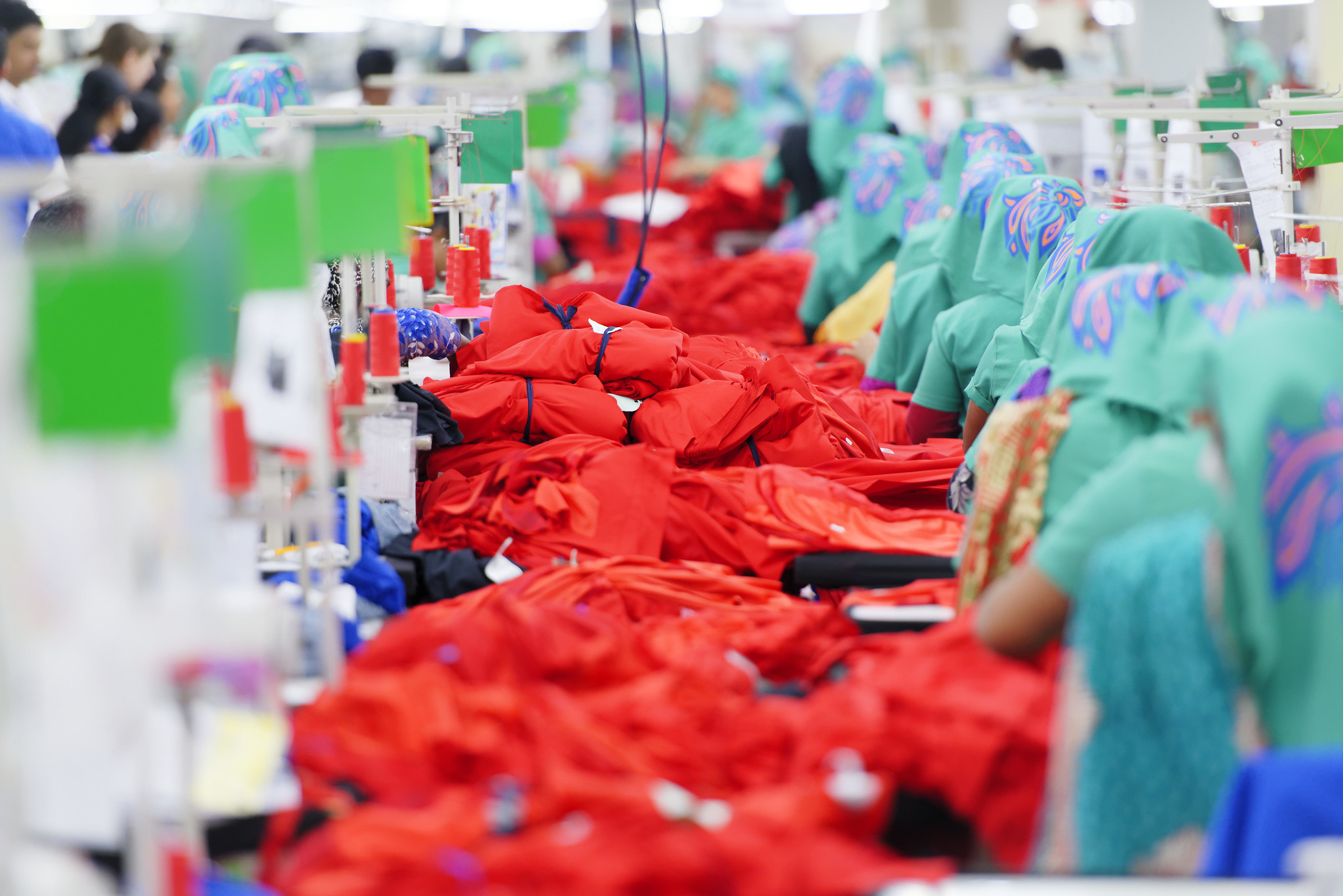
100 global brands and retailers have committed to the Pakistan Accord on Health and Safety in the Textile and Garment Industry (Pakistan Accord). Original Marines, Turner Bianca, S.O.K/ Group, Sun Garden,Tex Idea and MPL Home are among the latest brands to sign the agreement, which focuses on enhancing workplace health and safety in the Pakistani textile and garment industry.
The Pakistan Accord was established in January 2023 and is a Country Specific Safety Program (CSSP) being rolled-out as part of the renewed International Accord.
The Pakistan Accord covers all Cut-Make-Trim (CMT) facilities, namely Ready-Made Garments (RMG), home textile, fabric, and knit accessories suppliers, producing for Pakistan Accord signatory companies. Fabric mills will also be included at a later stage. Pakistan Accord signatory brands source from over 500 factories in Pakistan. Initial inspections at a first batch of factories supplying Pakistan Accord brands were conducted from October to December 2023.
Brands that sign the Pakistan Accord are committed to maintaining a long-term sourcing relationship with Pakistan and supporting their Pakistani suppliers in the journey to improve health and safety. We invite all garment and textile brands and retailers sourcing from Pakistan to sign the Pakistan Accord and contribute to a safe and sustainable textile and garment industry.
Resources:
Related updates
February 18, 2025
Factories in Pakistan have begun addressing key safety findings and are implementing improvements at their facilities.
November 28, 2024
On 26 and 27 November 2024 the Pakistan Accord conducted its inaugural safety training meeting in Pakistan. The meeting was attended by all employees of the factory.
August 29, 2024
This briefing provides updates on the number of signatory brands and covered factories, the rollout of Workplace Programs, and recent events organised by the Pakistan Accord team.
August 21, 2024
The Pakistan Accord Secretariat hosted a briefing on the rollout of Workplace Programs on August 19, 2024, in Karachi.
August 8, 2024
In view of the complex political situation in Bangladesh, the International Accord makes the following statement in solidarity with the people of Bangladesh.
May 1, 2024
Day 2 of the International Accord’s All Signatory Meeting was dedicated to fostering meaningful engagement between the Pakistani industry and signatories to the Pakistan Accord.
Pakistan Accord: Supplier Briefing #3
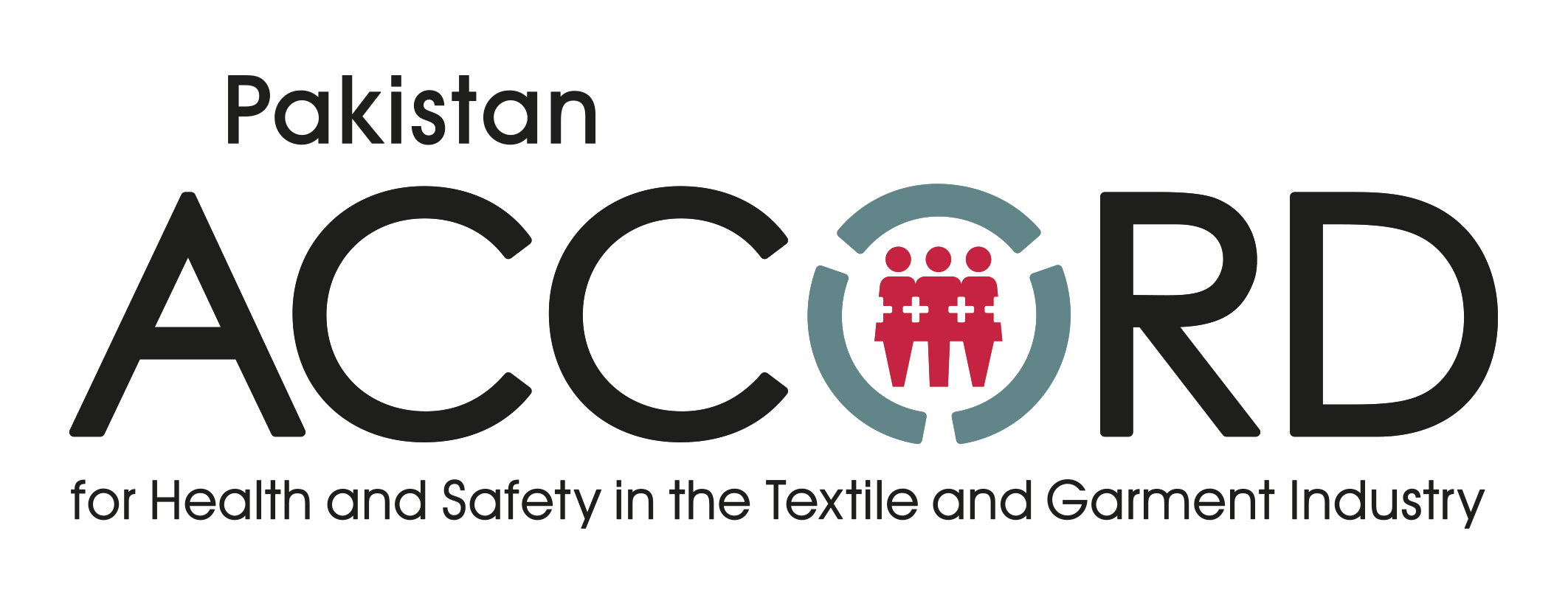
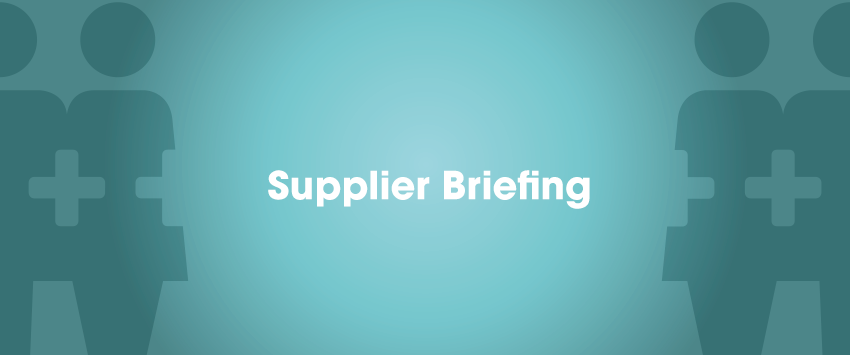
Supplier Briefing #3
These Supplier Briefings are designed for all factories/suppliers listed by Pakistan Accord signatory brands. They include updates on key developments under the Pakistan Accord, along with information on upcoming events, guidance materials, and resources for suppliers.
We encourage all suppliers/factories covered by the Pakistan Accord to read these briefings regularly and to share their recommendations, ideas, and suggestions by contacting us via pakistan.factories@internationalaccord.org.
This briefing includes updates on:
- Number of signatory brands, covered Factories
- Program Rollout: Pakistan Accord Building Standard, first safety inspections
- Implementation: Accord presence in Pakistan, Pakistan Accord Team
- New International Accord
Number of Signatory Brands and Covered Factories
At the time of writing this briefing, more than 90 global brands sourcing textiles and garments from Pakistan have signed the Pakistan Accord, thereby committing to work with their suppliers to ensure workplace safety. As stated by one of the Accord’s recent signatories to the Pakistan Accord, ASOS:
Due to the Pakistan program in place, ASOS has now started scoping Pakistan as a sourcing region as it was imperative for us to have a credible programme like Accord in place. We look forward to working together to create a safer working environment and empower workers.
The Pakistan Accord signatory brands are headquartered in 17 countries across Europe, Turkey, the USA, Australia, Hong Kong, and Japan, and include some of the world’s largest clothing brands and retailers. Collectively, these companies source over US$2.5 billion worth of goods from approximately 500 suppliers in Pakistan.
Program Rollout
Pakistan Accord Building Standard
Following extensive consultations with relevant stakeholders including the Pakistani Government, engineering experts, and academics over the past few months, the Pakistan Accord Building Standard (Standard) was finalised.
This Standard establishes minimum life-safety criteria to reduce danger to life from fire, structural, electrical, and boiler hazards as well as safety risks relating to the storage, use, and handling of hazardous substances. The application of this Standard is intended for new and existing garment and textile factories supplying Pakistan Accord company signatories. An independent Chief Safety Officer and team of engineers of the Pakistan Accord will assess Accord factory compliance with this Standard and produce reports of the safety hazards they identify.
The Standard was launched across a series of two webinars on 27 September and 4 October 2023 during which factories supplying Pakistan Accord signatory companies were invited to participate, engage with experts, and ask technical questions about the Standard.
First Safety Inspections Under the Pakistan Accord
The Pakistan Accord started a first round of initial inspections at factories supplying Pakistan Accord brands in Lahore and Karachi in October 2023. These initial inspections mark a significant milestone in the rollout of the Pakistan Accord.
The inspections were conducted as stipulated under the Pakistan Accord at four new facilities and four facilities that were part of the Accord pilot inspection program pilot safety assessments conducted between November and December 2022.
The Accord worked closely with the participating factories to support their preparation for the inspections. The support provided included meetings with Accord technical experts, opportunities to clarify any technical questions, and a detailed briefing document outlining the agenda for the day of inspection and actions where the factory’s support is needed.
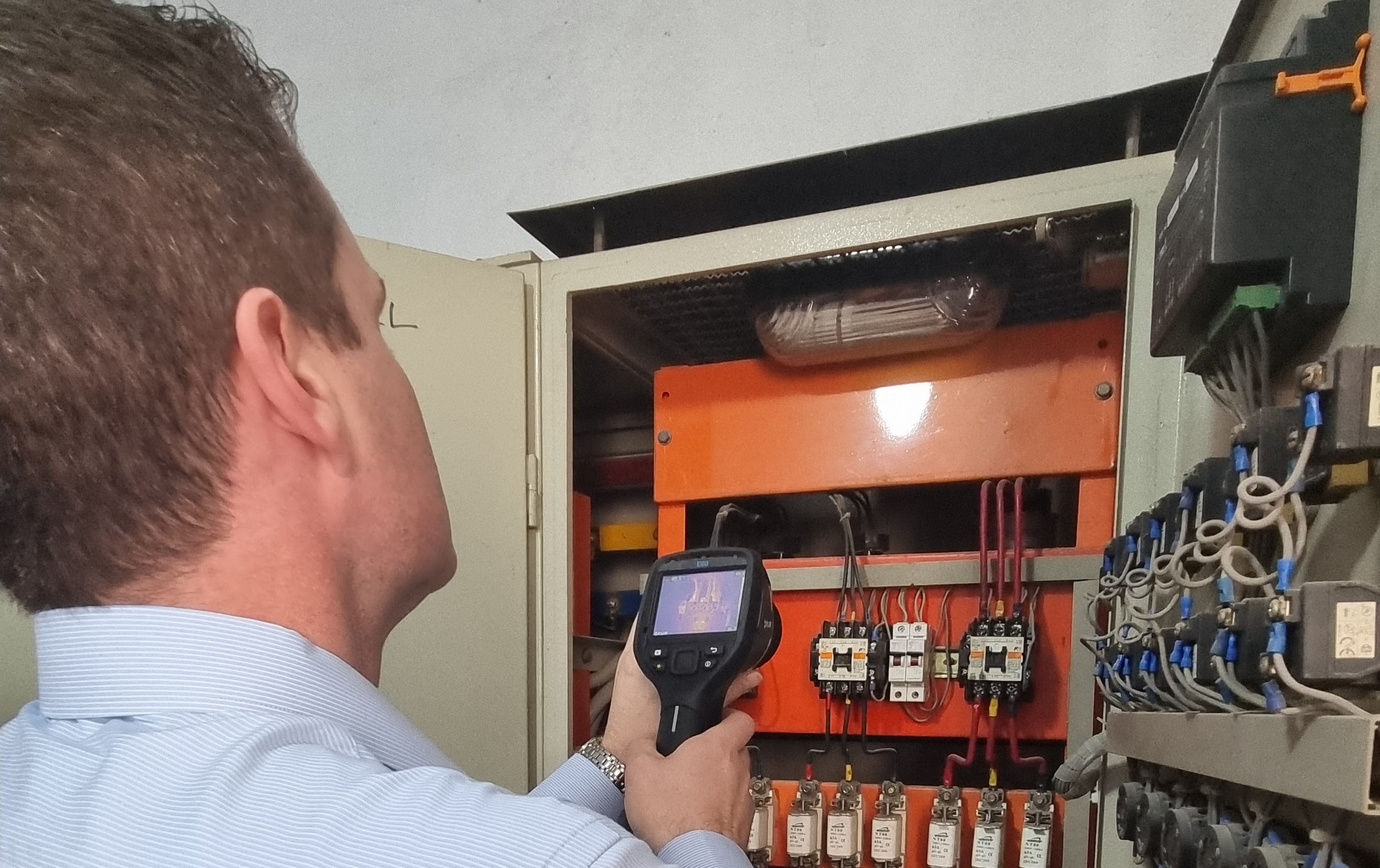
Throughout the inspection process, these factories demonstrated commitment to ensuring workplace safety, receptiveness to feedback, preparedness, and cooperation with our engineering teams. We look forward to our ongoing collaboration with these factories and their Accord brand customers to advance workplace health and safety.
The Pakistan Accord is continuing its rollout of the inspections program in the Province of Sindh and preparing for the roll-out of inspections in the Province of Punjab at the start of 2024.
Read more about the first batch of factories inspected under the Pakistan Accord.
Implementation
Accord Presence in Pakistan
As of September 2023, the International Accord BV, established to implement the Pakistan Accord for Health and Safety in the Textile and Garment Industry (Pakistan Accord) incorporated a private limited subsidiary company in Pakistan in the name of Health and Safety Accord Pvt. Ltd. This private company is undertaking the activities on behalf of Accord signatory companies and following the provisions of the Pakistan Accord, which include fire, electrical, structural, and boiler safety inspections, developing and monitoring the implementation of Corrective Actions Plans (CAPs), the implementation of workplace safety training and complaints program, and a local capacity building program.
Pakistan Accord Team
The Pakistan Accord is in the process of building local teams in Karachi and Lahore that will ensure the effective implementation of the Accord’s programs and smooth coordination with suppliers.
Most notably, the Pakistan Accord has recently recruited for the following positions :
- Country Manager
- Chief Safety Officer
- Chief Complaints Officer
- Fire, Electrical, and Structural Safety Engineers
- Remediation Department Manager
The Pakistan Accord operations are also supported by international engineering consultants and the International Accord Secretariat.
New International Accord
Negotiations between representatives of global brands and trade union signatories to the International Accord on Health and Safety in the Textile and Garment Industry (International Accord) have resulted in a new agreement that reaffirms their commitment to enhancing health and safety throughout the supply chains of brand signatories in Bangladesh, Pakistan, and other countries in the future.
Brands and trade unions have renewed their commitments for an extended three-year term, with an automatic renewal of another three years, making it the longest Accord commitment to date. This new version of the International Accord took effect on November 1, 2023. Additionally, the brands and trade unions finalised a new agreement to further their efforts in enhancing health and safety within the Bangladeshi garment industry through the RMG Sustainability Council (RSC).
How does the Pakistan Accord relate to the new International Accord? The Pakistan Accord, which was signed in January 2023 for three years, will continue as a Country-Specific Safety Program (CSSP) of the International Accord.
Read the International Accord, Bangladesh Safety Program, And Pakistan Accord Agreements here.
Read the statement about the renewal of the International Accord here.
Resources
Stay in Touch
Related updates
February 18, 2025
Factories in Pakistan have begun addressing key safety findings and are implementing improvements at their facilities.
November 28, 2024
On 26 and 27 November 2024 the Pakistan Accord conducted its inaugural safety training meeting in Pakistan. The meeting was attended by all employees of the factory.
August 29, 2024
This briefing provides updates on the number of signatory brands and covered factories, the rollout of Workplace Programs, and recent events organised by the Pakistan Accord team.
August 21, 2024
The Pakistan Accord Secretariat hosted a briefing on the rollout of Workplace Programs on August 19, 2024, in Karachi.
August 8, 2024
In view of the complex political situation in Bangladesh, the International Accord makes the following statement in solidarity with the people of Bangladesh.
May 1, 2024
Day 2 of the International Accord’s All Signatory Meeting was dedicated to fostering meaningful engagement between the Pakistani industry and signatories to the Pakistan Accord.
Over 50 Brands re-sign the New International Accord; 46 Brands Commit to the Bangladesh Safety Agreement
Updates on programs in Pakistan

A total of 56 global brands and retailers have so far signed the renewed International Accord, 48 have signed the Bangladesh Safety Agreement and 88 have signed the Pakistan Accord. Multiple brands are in the final stages of internal reviews and are expected to sign the agreements in the coming days. The latest list of signatories is available here.
Brands and trade unions renewed their commitments for an extended three-year term, with an automatic renewal of another three years making it the longest Accord commitment to date. The International Accord will serve as the framework for implementing the Accord’s Country-Specific Safety Programs (CSSPs), currently in Bangladesh and Pakistan, as well as any future programs in other garment producing countries. These programs will be implemented through separate agreements as CSSP Addendums to the International Accord.
Additionally, the brands and trade unions finalised the new Bangladesh Safety Agreement to further their efforts in enhancing health and safety within the Bangladeshi garment industry through the RMG Sustainability Council (RSC).
Both agreements entered into force on 1 November 2023.
Prior to these two new agreements, in December 2022 Accord signatories decided to establish a new workplace health and safety program called the Pakistan Accord for an initial term of three years starting on 1 January 2023.
We invite all garment and textile brands and retailers sourcing from Bangladesh and Pakistan to join the signatories to these agreements. We encourage you to re-sign the new International Accord, the Bangladesh Safety Agreement, as well as the Pakistan Accord, and reaffirm your commitment to our collective mission of a safe and sustainable textile and garment industry.
Resources:
Related updates
February 18, 2025
Factories in Pakistan have begun addressing key safety findings and are implementing improvements at their facilities.
November 28, 2024
On 26 and 27 November 2024 the Pakistan Accord conducted its inaugural safety training meeting in Pakistan. The meeting was attended by all employees of the factory.
August 29, 2024
This briefing provides updates on the number of signatory brands and covered factories, the rollout of Workplace Programs, and recent events organised by the Pakistan Accord team.
August 21, 2024
The Pakistan Accord Secretariat hosted a briefing on the rollout of Workplace Programs on August 19, 2024, in Karachi.
August 8, 2024
In view of the complex political situation in Bangladesh, the International Accord makes the following statement in solidarity with the people of Bangladesh.
May 1, 2024
Day 2 of the International Accord’s All Signatory Meeting was dedicated to fostering meaningful engagement between the Pakistani industry and signatories to the Pakistan Accord.
Read the International Accord, Bangladesh Safety Program and Pakistan Accord Agreements
Updates on programs in Pakistan
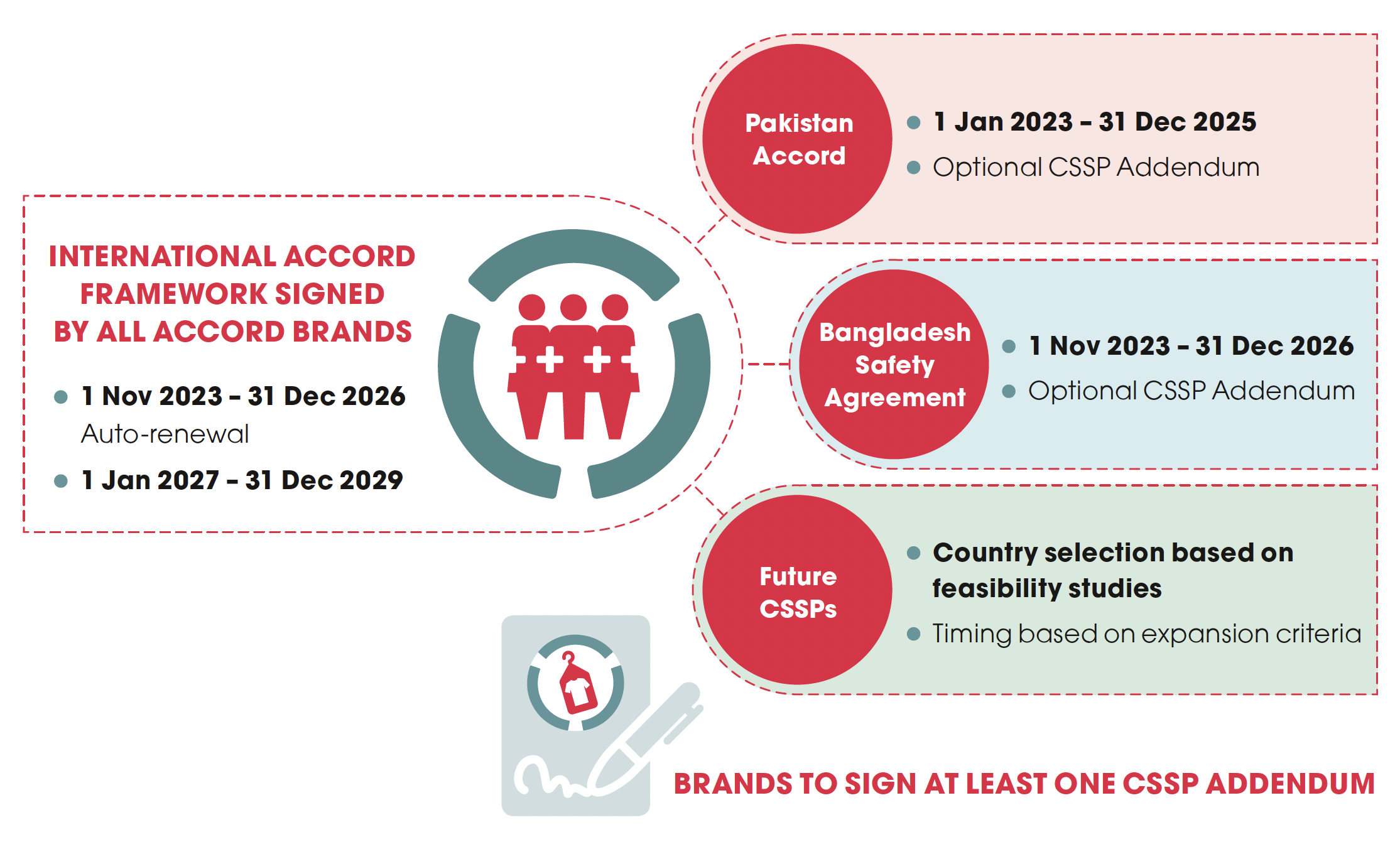
Highlights
-
Negotiations between representatives of global brands and trade union signatories to the International Accord have resulted in a new framework agreement. This agreement reaffirms their commitment to enhancing health and safety throughout the supply chains of the brand signatories.
-
Additionally, both the brands and trade unions finalised a new agreement to further their efforts in enhancing health and safety within the Bangladeshi garment industry through the RMG Sustainability Council (RSC).
-
The Pakistan Accord which was signed in January 2023 for a three-year period, will continue as an Addendum to the International Accord.
This post contains an overview of the agreements that form the basis of the Accord’s work in signatory supply chains in Bangladesh, Pakistan, and other countries in the future.
International Accord
The International Accord for Health and Safety in the Garment and Textile Industry (International Accord) is a legally binding framework agreement between garment brands and trade unions to ensure worker health and safety in the textile and garment industry. The agreement will serve as the framework for implementing the Accord’s Country-Specific Safety Programs (CSSPs), currently in Bangladesh and Pakistan, as well as any future programs in other garment producing countries.
The terms of each CSSP will be laid out in the Addendums to the International Accord. The CSSP Addendums build on the core principles, standards and protocols outlined in the International Accord.
Bangladesh Safety Program
The Bangladesh Agreement on Health and Safety in the Textile and Garment Industry (Bangladesh Safety Program) is an Addendum to the International Accord.
The Bangladesh Safety Program is a legally binding agreement between garment brands and trade unions to ensure worker health and safety in the Bangladeshi textile and garment industry. The signatory parties to Bangladesh Safety Program commit to the principles enshrined in the 2023 International Accord, and as stipulated in the 2013, 2018 and the 2021 Accord agreements on Fire and Building Safety in Bangladesh.
The inspections and remediation program, safety committee and safety training program, safety complaints mechanism, and reporting and disclosure requirements of the Accord will continue to be implemented in Bangladesh by the RMG Sustainability Council (RSC), which was established in June 2020.
More information about the origins, scope, key components, and resources related to the health and safety program in Bangladesh can be found here.
Pakistan Accord
In December 2022, Accord signatories agreed to establish a new workplace safety program in Pakistan for an initial term of 3 years, starting in 2023. The resulting agreement is called the Pakistan Accord on Health & Safety in the Textile & Garment Industry (Pakistan Accord) and outlines the envisaged program scope and key provisions to which company signatories commit to. The Pakistan Accord will continue as a CSSP Addendum under the International Accord.
The Pakistan Accord took effect on 1 January 2023 to ensure health and safety in the Pakistani textile and garment industry. Signatories to the Pakistan Accord are committed to fulfilling their obligations as outlined in this agreement until its expiration on 31 December 2025, with the possibility of renewal.
More information about the origins, scope, key components, and resources related to the Pakistan Accord can be found here.
Resources
Related updates
February 18, 2025
Factories in Pakistan have begun addressing key safety findings and are implementing improvements at their facilities.
November 28, 2024
On 26 and 27 November 2024 the Pakistan Accord conducted its inaugural safety training meeting in Pakistan. The meeting was attended by all employees of the factory.
August 29, 2024
This briefing provides updates on the number of signatory brands and covered factories, the rollout of Workplace Programs, and recent events organised by the Pakistan Accord team.
August 21, 2024
The Pakistan Accord Secretariat hosted a briefing on the rollout of Workplace Programs on August 19, 2024, in Karachi.
August 8, 2024
In view of the complex political situation in Bangladesh, the International Accord makes the following statement in solidarity with the people of Bangladesh.
May 1, 2024
Day 2 of the International Accord’s All Signatory Meeting was dedicated to fostering meaningful engagement between the Pakistani industry and signatories to the Pakistan Accord.
First Safety Inspections Under the Pakistan Accord
Updates on programs in Pakistan

The International Accord conducted the first round of initial inspections at factories supplying to Pakistan Accord brands in Lahore and Karachi between 16 – 28 October 2023. These initial inspections mark a significant milestone in the rollout of the Pakistan Accord on Health and Safety in the Textile and Garment Industry (Pakistan Accord) that was established as a new country program under the International Accord in January 2023.
The team, comprising engineers from Arup and representatives from the International Accord, including Danielle Antonellis (Technical Advisor, Pakistan Accord), Brad Loewen (Technical Consultant & Former Chief Safety Inspector of the Bangladesh Accord), assessed fire, electrical and structural safety these supplier factories, based on the Pakistan Accord Building Standard. Zulfiqar Shah (Consultant, Pakistan Accord) and Veronique Camerer (Head of Policy & Accountability, International Accord) joined the team of engineers and conducted side meetings with a number of key local stakeholders.
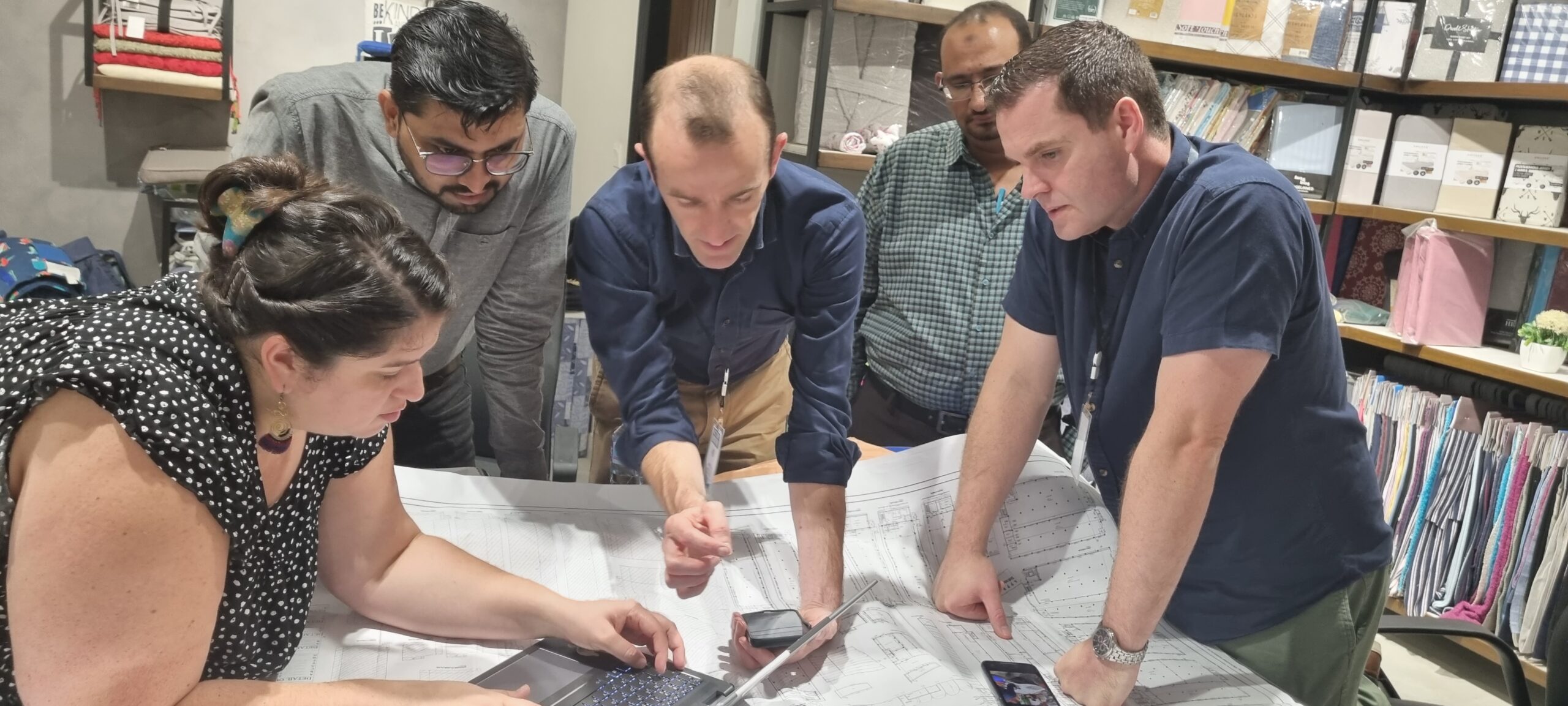
Participating Factories
The inspections were conducted at four new facilities and four facilities that were part of the pilot safety assessments conducted between November and December 2022. These participating factories demonstrated commitment to ensuring workplace safety, receptiveness to feedback, and preparedness throughout the initial inspection process. These facilities included: E&M Textiles, Mount Fuji Textiles Ltd., Kings Apparel Industries (Pvt) Ltd, Taiga Apparels, Denim Clothing Company, Fashion Knit Industries, Lucky Textile Mills Limited amongst others. We look forward to our ongoing collaboration with these factories and their contribution to ensuring health and safety in the textile and garment industry.
Support from Brands
The Accord brands sourcing from these factories participated actively in the process by communicating their support for the Pakistan Accord and explaining the importance of their suppliers’ participation in the Accord program for continuing their business relationship. Multiple Accord brand representatives also participated in the inspections as observers.
The Inspection Process
Each factory inspection lasted between 1-2 days based on the size and number of buildings and included the following steps:
- Opening meeting with factory owner and technical staff: Introductions & interview with the factory owner
- An overview of the Pakistan Accord program, the process towards developing inspection reports and corrective action plans.
- Review of pre-inspection questionnaire and documentation, such as engineering drawings, Building Permits, calculations, material and systems tests and any reports from previous assessments
- Scheduling & coordination of the fire alarm test
- Inspection of the building exterior and all interior rooms and spaces: 3 separate teams (fire, electrical, structural) inspected the building and assessed fire and building safety of all rooms and spaces.
- Testing: The teams carried out testing as required e.g., ferro-scanning (measuring rebar size in concrete structures), Schmidt Hammer test (measuring concrete strength), thermographic scanning (to identify electrical hotspots). The engineering team also requested the factory team to operate the fire alarm and fire pump systems.
- Closing meeting: Discussion between the Accord team and factory on main observations & next steps.
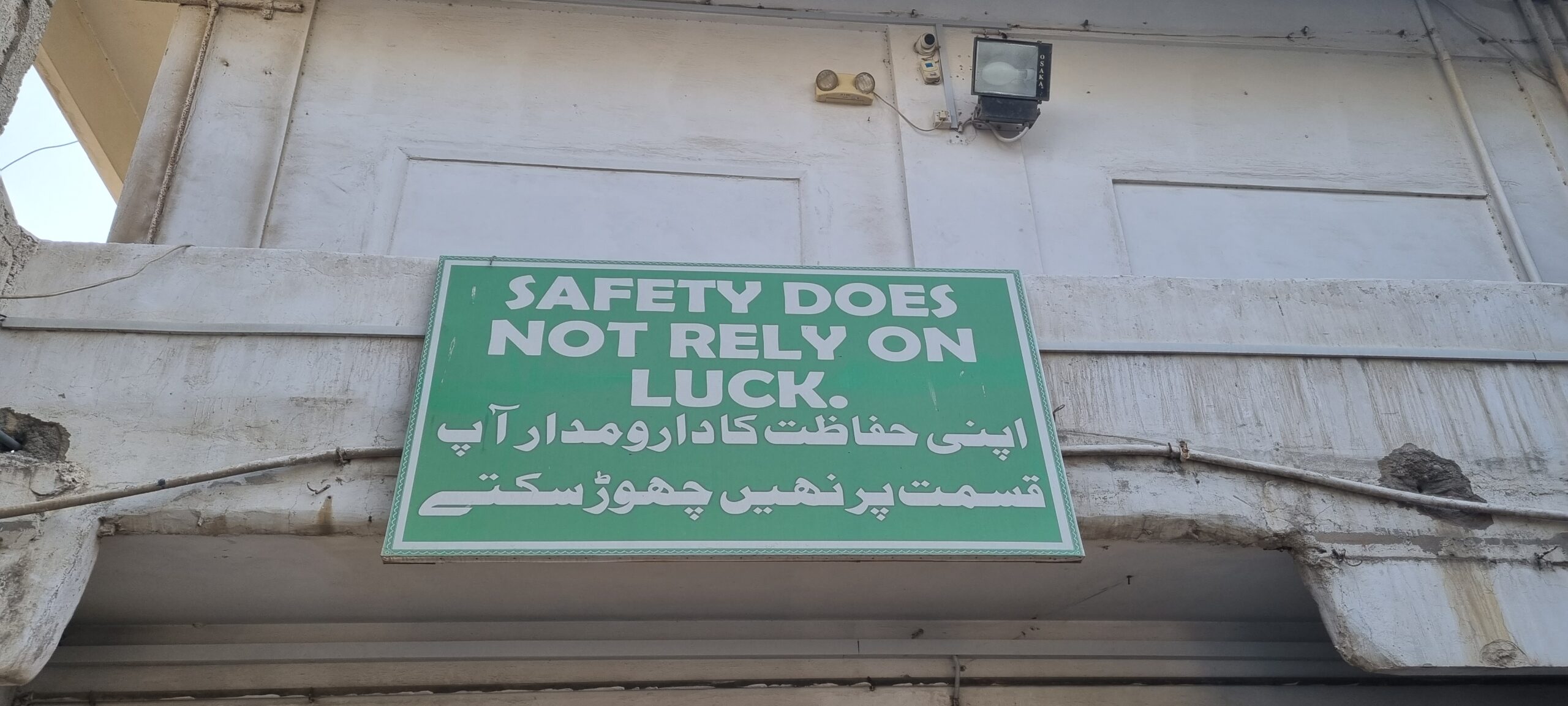
Next Steps
- Inspection reports will be prepared by the engineers and shared with the factory and Accord brands in 4-6 weeks, varying by complexity.
- Post-inspection meetings with the factories to discuss findings and remediation.
- Development of Corrective Action Plans (CAPs) with the support of Accord brands.
- CAP publication on the Accord website.
Background
Under the Pakistan Accord, all factories supplying to brand signatories will be inspected by independent engineers specialised in fire, structural, electrical, and boiler safety. These engineers assess the factories’ compliance with the Pakistan Accord Building Standard and produce reports of the safety hazards they identify at factories.
The scope of these safety inspections is as follows:
-
- Fire safety: to assess the adequacy of fire prevention, fire containment, early warning systems, and safe egress in case of fire.
- Structural safety: to assess the adequacy of engineering assessments, comparison of design drawings with the actual building, and adequacy of load management plans.
- Electrical safety: to assess the adequacy of cabling and wiring in the factory, capacity of staff to maintain electrical safety, risk or occurrence of hotspots, and fire risk from accumulation of dust and lint around electrical components.
- Hazardous Materials: to assess the use, storage, and handling of chemicals or substances that are classified as a physical hazard material or a health hazard material, whether the chemical or substance is in usable or waste condition.
- Boiler safety: to assess the external and internal condition, installation configuration, and safety monitoring system of each boiler in the factory. Boiler inspections will begin once adequate local capacity to conduct such inspections is achieved.
Resources
Related updates
February 18, 2025
Factories in Pakistan have begun addressing key safety findings and are implementing improvements at their facilities.
November 28, 2024
On 26 and 27 November 2024 the Pakistan Accord conducted its inaugural safety training meeting in Pakistan. The meeting was attended by all employees of the factory.
August 29, 2024
This briefing provides updates on the number of signatory brands and covered factories, the rollout of Workplace Programs, and recent events organised by the Pakistan Accord team.
August 21, 2024
The Pakistan Accord Secretariat hosted a briefing on the rollout of Workplace Programs on August 19, 2024, in Karachi.
August 8, 2024
In view of the complex political situation in Bangladesh, the International Accord makes the following statement in solidarity with the people of Bangladesh.
May 1, 2024
Day 2 of the International Accord’s All Signatory Meeting was dedicated to fostering meaningful engagement between the Pakistani industry and signatories to the Pakistan Accord.
Agreement on International Accord Framework for Health and Safety Programs
Global brands and trade unions have renewed the International Accord to enhance health and safety in supply chains in Bangladesh, Pakistan, and other countries in the future.
Statement
Amsterdam, 6 November 2023 [updated on 20 November]:
Negotiations between representatives of international textile retailers and the global trade union signatories to the International Accord on Health and Safety in the Textile and Garment Industry have culminated in an agreement that reaffirms their commitment to enhancing health and safety throughout the supply chains of the brand signatories.
Brands and trade unions have renewed their commitments for an extended three-year term, with an automatic renewal of another three years making it the longest Accord commitment to date.
This new iteration of the International Accord takes effect on 1 November 2023.
This enduring commitment reflects the conviction of the brand and trade union signatories in the Accord’s impact on workplace health and safety through independent factory inspections, remediation, safety training, and an effective worker complaints mechanism.
The renewed International Accord is a legally binding framework agreement under which Country-Specific Safety Programs (CSSPs) will be implemented in Pakistan and through the RMG Sustainability Council (RSC) in Bangladesh, with the provision to develop future health and safety programs in other major garment-producing countries based on feasibility and expansion criteria.
Key new features of the International Accord framework include:
- An international framework:
(a) committing to expanding the health and safety work progressively in the coming years to other countries, based on feasibility studies and successful progress made in the existing country programs;
(b) considering a future expansion of the scope of the worker complaints mechanism beyond health and safety in CSSPs; and
(c) outlining the key signatory obligations and principles upon which country programs will be built. The details of the country programs will be outlined in Addendums to the International Accord agreement.- Participating brands shall sign both the International Accord framework agreement and the relevant CSSP agreements they choose to participate in.
- The Pakistan Accord for Health and Safety in the Textile and Garment Industry (Pakistan Accord), which was signed in January 2023, will continue as an Addendum to the International Accord.
Negotiations for the new Bangladesh CSSP agreement concluded on 6 November. This agreement will continue the signatories’ commitments to the health and safety program in Bangladesh through the RSC as stipulated in a separate Bangladesh Safety Agreement available to read here.
The new International Accord will continue to build on the strong principles and approach that made the Accord effective. This includes factory inspections and remediation, safety training, worker awareness programs, a credible independent worker complaints mechanism, respect for freedom of association, independent administration and implementation, a high level of transparency, and provisions ensuring financially feasible remediation.
The International Accord Secretariat will support signatories in implementing the agreement and monitor signatory compliance with the International Accord agreement and its country Addendums.
Brands and retailers will be invited to sign the International Accord and the Bangladesh agreement from 20 November onwards. Brands sourcing from Pakistan that have not signed the Pakistan Accord yet are encouraged to sign as soon as possible.
The Accord encourages all garment and textile companies to sign this renewed framework agreement and join our collective goal of safe and sustainable textile and garment industry.
The International Accord Secretariat will announce the initial signatories to the International Accord and the Bangladesh program in the first week of December 2023.
Download the full text of the International Accord here.
For more information, contact:
- media@internationalaccord.org
- Mini Dixit, Communications Advisor: mini.dixit@internationalaccord.org
Related updates
February 18, 2025
Factories in Pakistan have begun addressing key safety findings and are implementing improvements at their facilities.
November 28, 2024
On 26 and 27 November 2024 the Pakistan Accord conducted its inaugural safety training meeting in Pakistan. The meeting was attended by all employees of the factory.
August 29, 2024
This briefing provides updates on the number of signatory brands and covered factories, the rollout of Workplace Programs, and recent events organised by the Pakistan Accord team.
August 21, 2024
The Pakistan Accord Secretariat hosted a briefing on the rollout of Workplace Programs on August 19, 2024, in Karachi.
August 8, 2024
In view of the complex political situation in Bangladesh, the International Accord makes the following statement in solidarity with the people of Bangladesh.
May 1, 2024
Day 2 of the International Accord’s All Signatory Meeting was dedicated to fostering meaningful engagement between the Pakistani industry and signatories to the Pakistan Accord.
Pakistan Accord: Supplier Briefing #2


Supplier Briefing #2
These Supplier Briefings are designed for all factories/suppliers listed by Pakistan Accord signatory brands. They include updates on key developments under the Pakistan Accord, along with information on upcoming events, guidance materials, and resources for suppliers.
We encourage all suppliers/factories covered by the Pakistan Accord to read these briefings regularly and to share their recommendations, ideas, and suggestions by contacting us via pakistan.factories@internationalaccord.org.
This briefing includes updates on:
- Number of Signatory Brands, Covered Factories
- Findings from the Accord Pilot in Pakistan
- Upcoming resources and events
Number of Signatory Brands and Covered Factories
At the time of writing this briefing, over 65 brands sourcing clothing and textiles from Pakistan have signed the Pakistan Accord, thereby committing to work with their suppliers to ensure workplace safety.
The Pakistan Accord company signatories are headquartered in 17 countries, spanning Europe, Turkey, the USA, Australia, Hong Kong, and Japan, and include some of the world’s largest clothing brands and retailers. Collectively, these companies source over US$2.5 billion worth of goods from more than 400 suppliers in Pakistan.
Signatory companies have recently disclosed their factory lists to the Accord, including data that will inform the selection of priority factories for initial inspections according to safety risks and leverage criteria.
Findings from Accord Pilot
The International Accord pilot safety assessments were initiated in September 2022 with the goal of understanding the key considerations for establishing an effective safety inspection and remediation program with garment and textile suppliers in Pakistan. The pilot included safety assessments at seven garment and textile factories in Karachi and Lahore, along with follow-up discussions on remediation feasibility with the participating factories.
A report summarising findings from these pilot safety assessments is now available here. The key areas of improvement for ensuring worker health and safety highlighted within the pilot report include:
- Structural design checks and preparation of accurate building drawings.
- Fire-separated construction and protected exit routes to allow safe egress in case of fire.
- Proper installation and testing of fire alarm and fire suppression systems to ensure full functioning in case of emergency.
- Electrical system design and installation conforming with code requirements, as well as maintenance and cleaning regimes to prevent electrical hazards.
- Maintenance and repair of boilers and associated systems to avoid the risk of serious accidents.
Pakistan Accord Building Standard
In recent months, the International Accord has worked with the former Chief Safety Inspector of the Accord on Fire and Building Safety in Bangladesh, Brad Loewen, to review Pakistani building codes and develop a draft factory safety standard for the Pakistan Accord, covering electrical, fire, structural, and boiler safety.
In May 2023, the International Accord team met with engineering and building code experts in Pakistan for consultation on key details in the Standard. These experts will review the latest draft of the Pakistan Accord Building Standard (Standard) in the coming weeks.
The Accord intends to finalise and publish the Standard by the end of August 2023. Factories covered under the Pakistan Accord will subsequently be inspected against this finalised Standard.
Upcoming: New Information Pack for Suppliers
Following requests from industry representatives in recent meetings, the Accord has developed an Information Pack for Suppliers to share all relevant information about the Pakistan Accord in one place. This information pack will be circulated in the coming weeks and includes:
- A summary detailing the objectives, scope, and programs under the Pakistan Accord.
- Inforgraphic on a factory’s journey through Accord programs.
- Benefits of participating in Accord programs.
- A summary of the Implementation Plan.
- Supplier FAQs with answers to the commonly asked questions from suppliers.
Upcoming Events
Launch of the Pakistan Accord Building Standard
Resources
Stay in Touch
Related updates
February 18, 2025
Factories in Pakistan have begun addressing key safety findings and are implementing improvements at their facilities.
November 28, 2024
On 26 and 27 November 2024 the Pakistan Accord conducted its inaugural safety training meeting in Pakistan. The meeting was attended by all employees of the factory.
August 29, 2024
This briefing provides updates on the number of signatory brands and covered factories, the rollout of Workplace Programs, and recent events organised by the Pakistan Accord team.
August 21, 2024
The Pakistan Accord Secretariat hosted a briefing on the rollout of Workplace Programs on August 19, 2024, in Karachi.
August 8, 2024
In view of the complex political situation in Bangladesh, the International Accord makes the following statement in solidarity with the people of Bangladesh.
May 1, 2024
Day 2 of the International Accord’s All Signatory Meeting was dedicated to fostering meaningful engagement between the Pakistani industry and signatories to the Pakistan Accord.
First Supplier List for Pakistan Accord Signatories
Updates on programs in Pakistan
The Accord Secretariat has published the first list of suppliers covered under the Pakistan Accord as of 25 July 2023. The Factory Disclosure Report for Pakistan provides an overview of the names, addresses, storeys, production processes, number of workers, and the number of signatory brands sourcing from each factory.
This list comprises information on over 400 factories supplying 52 Pakistan Accord signatory brands, and it is expected to grow further as more recent signatories disclose their supplier information in the coming days.
The Accord will publish an updated list of suppliers monthly across the Transparency & Accountability and Factories pages of this website.
Resources:
Related updates
February 18, 2025
Factories in Pakistan have begun addressing key safety findings and are implementing improvements at their facilities.
November 28, 2024
On 26 and 27 November 2024 the Pakistan Accord conducted its inaugural safety training meeting in Pakistan. The meeting was attended by all employees of the factory.
August 29, 2024
This briefing provides updates on the number of signatory brands and covered factories, the rollout of Workplace Programs, and recent events organised by the Pakistan Accord team.
August 21, 2024
The Pakistan Accord Secretariat hosted a briefing on the rollout of Workplace Programs on August 19, 2024, in Karachi.
August 8, 2024
In view of the complex political situation in Bangladesh, the International Accord makes the following statement in solidarity with the people of Bangladesh.
May 1, 2024
Day 2 of the International Accord’s All Signatory Meeting was dedicated to fostering meaningful engagement between the Pakistani industry and signatories to the Pakistan Accord.

